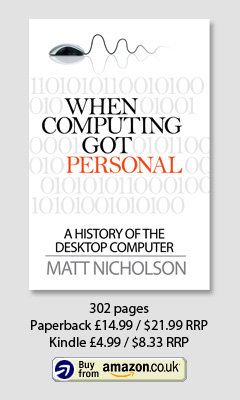Protecting your intellectual property
This is my editorial from the Spring 2013 issue of HardCopy magazine:
 Over the past decade or so, those involved in the distribution of intellectual property (IP) have had their worlds turned inside out by the Internet. First it was the music business getting to grips with the illegal download of music through services such as Napster. More recently the film industry has had to watch DVD sales plummet as online streaming sites such as Netflix steal business away from high-street shops. Meanwhile there’s panic in the bookshops as they attempt to compete with Amazon and the downloadable eBook. About the only IP industry not affected is that of invention. As far as I know, patents continue to be licensed and sold in much the same was as they’ve always been.
Over the past decade or so, those involved in the distribution of intellectual property (IP) have had their worlds turned inside out by the Internet. First it was the music business getting to grips with the illegal download of music through services such as Napster. More recently the film industry has had to watch DVD sales plummet as online streaming sites such as Netflix steal business away from high-street shops. Meanwhile there’s panic in the bookshops as they attempt to compete with Amazon and the downloadable eBook. About the only IP industry not affected is that of invention. As far as I know, patents continue to be licensed and sold in much the same was as they’ve always been.
The reason for this revolution lies in the fact that the Internet has all but eliminated the cost of distribution. Prior to the Internet, distributing IP such as music, film or books cost serious money. Vinyl records, CDs and DVDs had to be manufactured; paperbacks and hardbacks had to be printed and transported. But underneath it all was just raw data, and with the Internet, the incremental cost of distributing data is virtually nothing.
Of course one of the first industries to get to grips with the Internet was the software industry. Even before the Internet, distribution costs were fairly low, and it quickly became obvious that the value lay in the intellectual property – in other words the source code – rather than in the medium by which it was distributed, which is why you buy a licence to use software, rather than the software itself. This is of course also true of films and music and books, but here it is readily accepted that customers can sell the DVDs and CDs and paperbacks they have bought to their friends, because this is a clear transfer of use from one person to another.
Which makes the recent case of Usedsoft vs. Oracle particularly interesting. Like most software companies, what Oracle sells is a perpetual licence to use its software, rather than the software itself. German company Usedsoft, on the other hand, are in the business of buying and selling unused software licences. Despite vigorous argument from Oracle, the European Court of Justice has ruled that anyone in possession of a perpetual licence to use a computer program has the right to sell the licence on, even if they had originally downloaded the software from the author’s Web site. The ruling effectively puts software on the same footing as paperbacks and DVDs, so going against the generally accepted view that a perpetual licence cannot be transferred.
For the industry, volume licences which are renewed every year or so provide a measure of defence against the decision. However software distribution is already learning lessons from elsewhere. Services such as Adobe Creative Cloud or Microsoft Office 365, where software is sold on a monthly or annual subscription service, bear comparison with Netflix, which serves much the same purpose.
